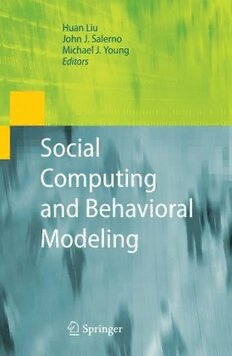Download Social Computing and Behavioral Modeling PDF Free - Full Version
Download Social Computing and Behavioral Modeling by Alex Pentl (auth.), Michael J. Young, John Salerno, Huan Liu (eds.) in PDF format completely FREE. No registration required, no payment needed. Get instant access to this valuable resource on PDFdrive.to!
About Social Computing and Behavioral Modeling
Social computing concerns the study of social behavior and context based on computational systems. Behavioral modeling reproduces the social behavior, and allows for experimenting, scenario planning, and deep understanding of behavior, patterns, and potential outcomes. The pervasive use of computer and Internet technologies creates an unprecedented environment where people can share opinions and experiences, exchange ideas, offer suggestions and advice, debate and even conduct experiments. Social computing facilitates behavioral modeling in model building, analysis, pattern mining, anticipation, and prediction. This volume presents material from the second interdisciplinary workshop focused on employing social computing for behavioral modeling and prediction. The book provides a platform for disseminating results and developing new concepts and methodologies aimed at advancing and deepening our understanding of social and behavioral computing to aid critical decision making. The contributions from this year’s conference, incorporating views from government, industry and academia, address themes such as:social network analysismodelingmachine learning and data miningsocial behaviors and social orderpublic healthcultural aspectstrust, privacy, and intentionopinion, preference, influence, and diffusionextreme eventsassessment and validationeffects and searchResearchers, practitioners and graduate students from sociology, behavioral and computer science, psychology, cultural study, information systems, political science, and operations research are certain to find this a fascinating and essential resource.
Detailed Information
| Author: | Alex Pentl (auth.), Michael J. Young, John Salerno, Huan Liu (eds.) |
|---|---|
| Publication Year: | 2009 |
| ISBN: | 9781441900562 |
| Pages: | 276 |
| Language: | English |
| File Size: | 14.574 |
| Format: | |
| Price: | FREE |
Safe & Secure Download - No registration required
Why Choose PDFdrive for Your Free Social Computing and Behavioral Modeling Download?
- 100% Free: No hidden fees or subscriptions required for one book every day.
- No Registration: Immediate access is available without creating accounts for one book every day.
- Safe and Secure: Clean downloads without malware or viruses
- Multiple Formats: PDF, MOBI, Mpub,... optimized for all devices
- Educational Resource: Supporting knowledge sharing and learning
Frequently Asked Questions
Is it really free to download Social Computing and Behavioral Modeling PDF?
Yes, on https://PDFdrive.to you can download Social Computing and Behavioral Modeling by Alex Pentl (auth.), Michael J. Young, John Salerno, Huan Liu (eds.) completely free. We don't require any payment, subscription, or registration to access this PDF file. For 3 books every day.
How can I read Social Computing and Behavioral Modeling on my mobile device?
After downloading Social Computing and Behavioral Modeling PDF, you can open it with any PDF reader app on your phone or tablet. We recommend using Adobe Acrobat Reader, Apple Books, or Google Play Books for the best reading experience.
Is this the full version of Social Computing and Behavioral Modeling?
Yes, this is the complete PDF version of Social Computing and Behavioral Modeling by Alex Pentl (auth.), Michael J. Young, John Salerno, Huan Liu (eds.). You will be able to read the entire content as in the printed version without missing any pages.
Is it legal to download Social Computing and Behavioral Modeling PDF for free?
https://PDFdrive.to provides links to free educational resources available online. We do not store any files on our servers. Please be aware of copyright laws in your country before downloading.
The materials shared are intended for research, educational, and personal use in accordance with fair use principles.

